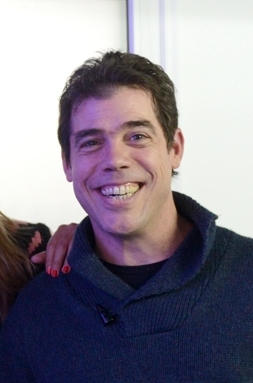
The Green Ecologist Party was a Chilean political party and one of South America's members of the global green movement.
Juntos Podemos Más por Chile was a political coalition created in 2003, consisting of the Communist Party of Chile, the Humanist Party, the Christian Left Party of Chile, and several other smaller left-wing organizations.

The Humanist Party is a universal humanist, progressive, and left-wing political party in Chile, founded in 1984. The party is a member of the Humanist International.

General elections were held in Chile on Sunday 13 December 2009 to elect the president, all 120 members of the Chamber of Deputies and 18 of the 38 members of the Senate were up for election. As no presidential candidate received a majority of the vote, a second round was held between the top two candidates—Sebastián Piñera and Eduardo Frei Ruiz-Tagle—on Sunday 17 January 2010. Piñera won the runoff with 52% of the vote and succeeded Michelle Bachelet on 11 March 2010.

Marco Antonio Enríquez-Ominami Gumucio is a Chilean-French, filmmaker, politician, and perennial candidate. From 2006 to 2010 he was a Socialist Party deputy in Chile's lower chamber. In 2009 he quit the party and ran for President of the Republic as independent, where he finished third with 20% of the vote. He is currently the leader of the Progressive Party, which he founded in 2010.

The Coalition for Change was a presidential and parliamentary electoral coalition that groups the supporters of Sebastián Piñera for the 2009-10 Chilean presidential election. Its predecessor was the Alliance for Chile. The constituent parties are the Independent Democratic Union, National Renewal, ChileFirst, the movements Grand North, and Christian Humanism.

General elections were held in Chile on 17 November 2013 to elect the president, all 120 members of the Chamber of Deputies, 20 of the 38 members of the Senate and 278 members of regional boards. All elected members would serve a four-year term, aside from the Senators would serve for eight years. All the newly elected authorities began their terms on 11 March 2014.

The MAS Region, known until 2014 as Broad Social Movement was a Chilean left-wing political party founded by Alejandro Navarro in 2008.

If You Want It, Chile Changes was a Chilean electoral coalition that brought together a group of Chilean opposition parties to the Chilean presidential, parliamentary and regional advisors elections in 2013. It supported the presidential candidacy of Marco Enríquez-Ominami, who lost the election.

The Liberal Party of Chile is a social-liberal political party in Chile, founded 26 January 2013 in Santiago, Chile. The main figure of the party is the deputy Vlado Mirosevic.

The presidential primaries of the Concertación de Partidos por la Democracia of 2009 were the method of election of the presidential candidate of such a Chilean coalition for the 2009 presidential election. Eduardo Frei Ruiz-Tagle, former President of Chile (1994–2000), a member of the Christian Democrat Party (PDC) and candidate for his party, the Socialist Party of Chile (PS) and the Party for Democracy (PPD), and José Antonio Gómez, a militant and candidate of the Radical Social Democratic Party.
Citizens was a Chilean political party founded in 2013, with members comprising militants and independents of the center and center-left whose beliefs did not align with New Majority or Chile Vamos. Party militants mainly came from the Christian Democratic Party and the Party for Democracy.
The Republican Party is a right-wing populist and conservative political party in Chile. Its founder and former leader is Chilean presidential candidate José Antonio Kast.

General elections were held in Chile on 21 November 2021, including presidential, parliamentary and regional elections. Voters went to the polls to elect the President of the Republic to serve a four-year term, 27 of 50 members of the Senate to serve an eight-year term in the National Congress, all 155 members of the Chamber of Deputies to serve a four-year term in the National Congress, and all 302 members of the regional boards to serve a three-year term. Following an electoral reform in 2015, the Senate increased its membership from 38 to 43 in 2017 and grew to its full size of 50 seats after this election.

Constituent Unity was a political alliance in Chile. It included the former members of the Concentration of Parties for Democracy, plus the Progressive Party and Citizens.

Álvaro Escobar Rufatt is a Chilean actor, television presenter, lawyer, musician, journalist, radio personality and politician. He was a deputy of the Republic of Chile for District No. 20, which included the communes of Cerrillos, Estación Central and Maipú during the 2006–2010 period. He is mainly known as an actor and television presenter, although he has been involved in many professional activities.
New Social Pact was a Chilean centre to centre-left political coalition established on 23 August 2021 in order to participate in the presidential and parliamentary elections of that year. This pact is made up of the parties for Democracy (PPD), Radical (PR), Socialist (PS), Christian Democratic (PDC), Citizens (CIU), Liberal (PL) and the platforms New Deal and New Chile.

Marisela del Carmen Santibáñez Novoa is a Chilean actress, presenter, and politician of the Communist Party (PCCh). She has been a member of the Chamber of Deputies for District 14 since March 2018.
General elections are expected to be held in Chile in 2025 in line with the constitutional requirement for elections to be held every four years to elect members of the National Congress and the president. Incumbent president Gabriel Boric is ineligible to seek a second consecutive term according to the 1980 constitution.

The Progressive Homeland was a Chilean political party founded in October 2022. It is considered the successor of the Progressive Party (PRO), a formation led by former congressman and former presidential candidate Marco Enríquez-Ominami. Its registration was accepted by the Electoral Service of Chile (Servel) in August 2023.















